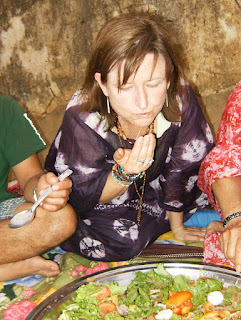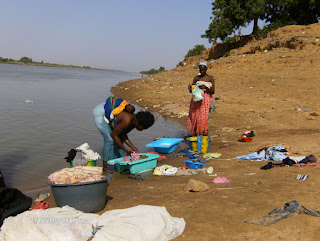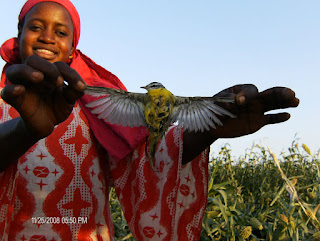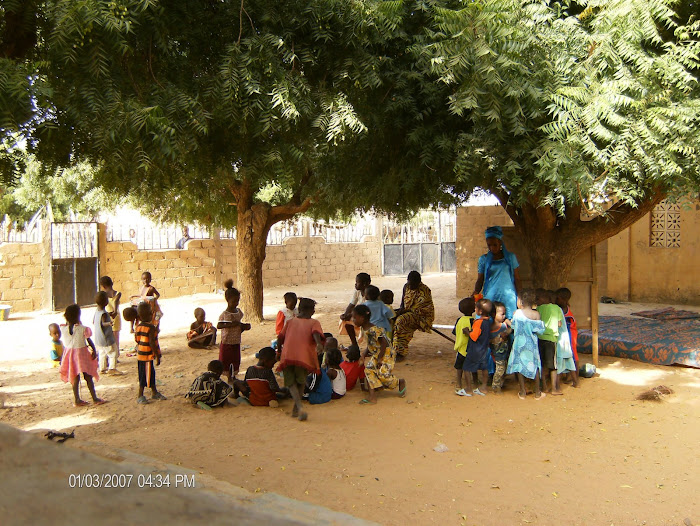"Yesterday I spent the whole day at my local sister's wedding:
 it was AWESOME! I've never seen so much of the wedding as I did here. First I was sitting with her mom, aunts, grandma, the "women of the family" and these four singing ladies sang the bride's genealogy, sang her praises, and sang her many blessings. One woman sang the lead and played a beat with two dried out gourds tied together, with her rings adding to the music as she drummed the gourds on the ground. The next three sang the echo; two of which were clapping and one was banging a small cooler like it was a drum. The four of them were sitting mixed in with the rest of us, so we had surround sound! Meanwhile people were coming in the room to give gifts for the bride: eating bowls, straw mats, mixing bowls, pitchers with cups, tea sets, buckets (tons!), clothes and fabrics, a broom and everything she'll need to start her new home.
it was AWESOME! I've never seen so much of the wedding as I did here. First I was sitting with her mom, aunts, grandma, the "women of the family" and these four singing ladies sang the bride's genealogy, sang her praises, and sang her many blessings. One woman sang the lead and played a beat with two dried out gourds tied together, with her rings adding to the music as she drummed the gourds on the ground. The next three sang the echo; two of which were clapping and one was banging a small cooler like it was a drum. The four of them were sitting mixed in with the rest of us, so we had surround sound! Meanwhile people were coming in the room to give gifts for the bride: eating bowls, straw mats, mixing bowls, pitchers with cups, tea sets, buckets (tons!), clothes and fabrics, a broom and everything she'll need to start her new home.  Ghana (the bride) is turning 17 years old this year (and she's gorgeous! I swear 90% of the villagers could be models in the states!)
Ghana (the bride) is turning 17 years old this year (and she's gorgeous! I swear 90% of the villagers could be models in the states!) Later we all ate lunch: rice topped with beef (killed that morning), slices of green and yellow bell peppers, onions, tomatoes, and carrots. Then I went with some cousins to the khaima (say it: hi-ma) for music and dancing. Everyone sits on the ground under these huge tents propped up on poles and face the middle.
 As people are moved by the music, one, two or three people will dance to show off how fast, smooth, and well they can dance. Their heads could be balancing water, but their legs are bouncing along, their butts sticking out, back, left, right, and even up! It's so artful!
As people are moved by the music, one, two or three people will dance to show off how fast, smooth, and well they can dance. Their heads could be balancing water, but their legs are bouncing along, their butts sticking out, back, left, right, and even up! It's so artful!Then I "snuck out" to get pictures of the bride with her bridesmaids:
 they were stunning! A crown of two braids, with gold earrings pinned in the front of a braid, big metallic blue eye shadow, and matching dresses.
they were stunning! A crown of two braids, with gold earrings pinned in the front of a braid, big metallic blue eye shadow, and matching dresses.  Ghana had tons of braids, gold hanging everywhere from her hair, neck, hands and body, henna going up her arms and feet, and a very detailed tie-dyed dress.
Ghana had tons of braids, gold hanging everywhere from her hair, neck, hands and body, henna going up her arms and feet, and a very detailed tie-dyed dress.I sat with the older women as they gave Ghana's mother 500 or 1,000 Ouguiya (about $2 or $4) to help her with the "loss" of her daughter from the house. As the sun was setting people left; there was apparently a dinner and more dancing that night but I was tired, don't like to go out at night, and had stuff to do on-line. The next day Ghana will be leaving to her new husband's house. Well, his family’s house. I didn't even see him the whole day! He didn't come to this half of the wedding!
...
Issa is Ghana's new husband, and their home is a veritable mansion! When I got back to the bride's house I found people looking at photos: the photographer got his pictures printed so the people could buy them. All the photos were being passed, handled, traded, etc.
 Around 5pm, as people were packing the 3 taxis with the wedding gifts, Ghana started crying, wailing, and I thought, "How dramatic!!" But really, she's never left her home town and now she's leaving her home, her parents, and her family, to go to her new husband--to be with a man for the first time.
Around 5pm, as people were packing the 3 taxis with the wedding gifts, Ghana started crying, wailing, and I thought, "How dramatic!!" But really, she's never left her home town and now she's leaving her home, her parents, and her family, to go to her new husband--to be with a man for the first time.So we pile into the 5 seaters, fitting 8 people in each car, take a canoe, a van, and get to Issa's house. A man, I'm not sure who since its night now, picks up Ghana (who is totally covered so no one can actually see any part of her body), puts her over his shoulder and lays her at her new grandma-in-law's feet, to rest her head on grandma's lap. Then her new mother sprinkles her with dried flowers while blessing the woman, and a liquid (smelled like milk), to bless the marriage. Then we--the bride's 8-woman entourage-- lead Ghana to her new mother's room to bring good luck and blessings to the marriage.
We then showered, ate dinner (meat and potatoes, also killed that morning), and hung out until around 1am while her "mothers" prepared her room (aka burning incense, putting on clean sheets, etc). Then the bride (who is still covered head to toe) was taken to her room.
After dinner I was talking to the groom, Issa, and found out that he's been living in Ohio for the past 11 years and came back to find a wife. About a month ago he saw Ghana, fell in love, asked her father's permission, I don't know what the whole process was, but they all agreed, and now, only 3.5 weeks later, she's married to him!

So I slept on the roof (very common) with her 3 cousins--all 17 or 18 years old (the four of us were the bride's "company" here to talk to her, keep her company, and help her with household chores so she can just relax)--and Anna, the youngest, couldn't sleep because she was so worried for Ghana's pain. We stayed up talking until 3am, as she was sure that Ghana would cry out, come running out, or start cursing Issa and his family.
...
So this morning the bride woke up and her husband gave her $200 and fancy gold jewelry--for being a virgin. Her new in-laws danced, sang out that "Tokomadji has married into the village, a good woman joined the family, and they're so blessed."
THEN more women came, started drumming on upside-down bowls, dancing, singing, and putting money into the mother of the bride's head scarf!

Now I'm sitting with Ghana, telling her how birth control IS good, no matter what she's heard in the streets (that she'll bleed to death or become sterile if she takes it). She has to stay in this room for a week! (It's like a honey moon: she does no work, just lounges around eating for seven days).
...
Women keep randomly dancing, singing, and drumming in the hallway outside Ghana's room.

...
The next day (a full 4 days since the wedding began at Ghana's parents' house) they "displayed the gifts" meaning they took out ALL the bowls, buckets, brooms, and gifts, set them out in front of the mother in law's house, and everyone came to see. Again, they were dancing, drumming, and singing as the mother of the bride, the mother in law, and 2 aunts divided up all the gifts: one pile for Ghana to start her new household, one for the mother in law, and random gifts given to the family members until ALL of it is claimed by one person or another."
........
And then I came home to Tokomadji. I know that Ghana is just about to end her week of being served while she's confined to her new room, then she'll be treated like a queen (inshallah) by her rich, American husband.




















































